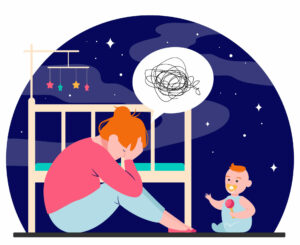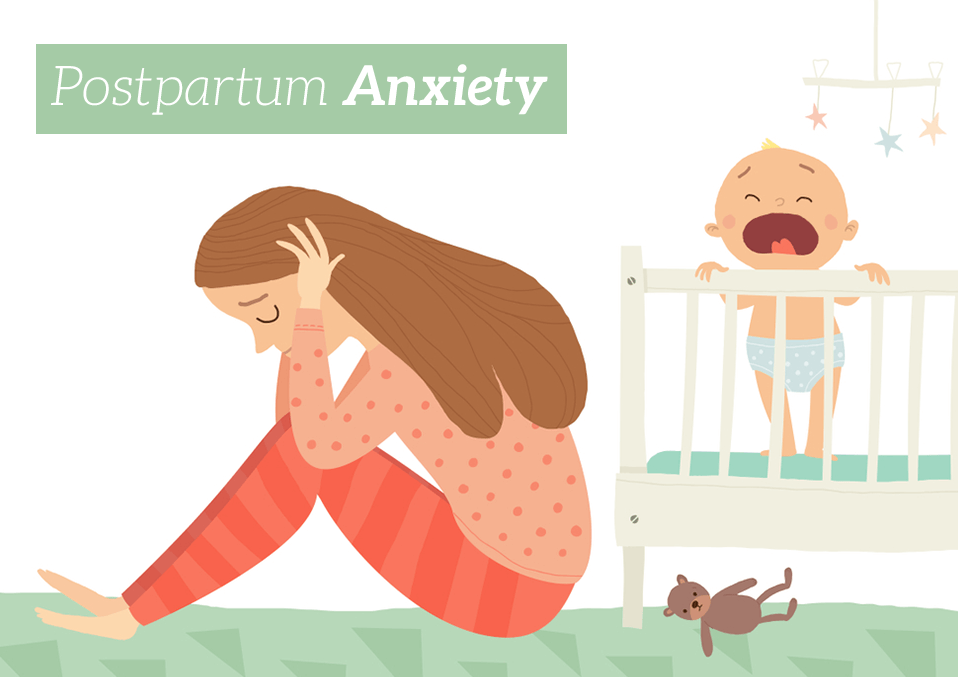Postpartum anxiety is a serious condition that affects new moms. It’s a type of anxiety that can develop after giving birth, and it can range in severity. In this post, we’ll explore what postpartum anxiety is, its symptoms, and how you can get help if you experience it.
Contents
What is Postpartum Anxiety?

Postpartum anxiety is a psychiatric disorder that affects women after they give birth. Symptoms can range from mild to severe and can last for weeks or months.
There is no one cause of postpartum anxiety, but it is often linked to factors like childbirth pain, breastfeeding difficulties, and post-birth depression.
Postpartum anxiety can also be caused by hormone changes, such as during the early postpartum period.
If you’re experiencing symptoms of postpartum anxiety, talk to your doctor. He or she may be able to prescribe medication or recommend therapy.
What Are The Symptoms of Postpartum Anxiety?
Postpartum anxiety is a condition that affects new mothers. It’s a type of mental health disorder that can occur in both first-time and repeat moms, but it’s most common after the birth of a baby.
The symptoms of postpartum anxiety can vary from woman to woman, but they often include feeling afraid or panicky all the time, feeling like you can’t stop crying, having trouble sleeping, experiencing intense mood swings, and worrying about your baby constantly.
Some of these signs of postpartum anxiety can be:
Feeling afraid: One of the main signifiers of postpartum anxiety is the feeling of being afraid all the time. This can come in waves, where you’ll feel one level of fear for some time, and then it’ll spike and you’ll feel much more anxious.
Trouble sleeping: Many moms experience a lack of sleep after giving birth. This can lead to anxiety because it makes it difficult to relax and fall asleep.
Intense mood swings: One common symptom of postpartum anxiety is intense mood swings that can be very hard to control. You may go from feeling great one minute and then completely losing your temper the next, or you may feel extremely sad one moment and then incredibly happy the next.
Feeling like you can’t stop crying: Crying is a natural response to stress and anxiety, but for some new moms, it can feel like crying all the time. This is another symptom of postpartum anxiety that can be hard to manage.
Constant worrying: One of the hallmarks of postpartum anxiety is constantly worrying about your baby. You may find yourself obsessing about little things, like how your baby is doing or what they’re eating. This can be incredibly stressful and lead to more anxiety.
Reasons For Postpartum Anxiety

There are many reasons why some women experience postpartum anxiety. Here are some of the most common:
1. Previous experiences with childbirth may have increased your anxiety levels. If you’ve had a difficult or traumatic birth experience, your anxiety may continue to increase after giving birth.
2. Changes in your body following childbirth can also contribute to postpartum anxiety. You may feel exhausted and sore, which can trigger feelings of fear and stress.
3. Your hormones may cause you to feel anxious and/or depressed after giving birth. After delivering a baby, your estrogen levels drop rapidly, and your progesterone levels spike, which can cause mood swings and other symptoms like anxiety.
4. Stressful life events, such as financial problems or family conflict, can also lead to postpartum anxiety. If you find yourself struggling with these issues right after giving birth, you may become more worried about how your new arrival is affecting your life as a whole.
5. Postpartum depression is another possible reason for postpartum anxiety. This condition affects up to 25% of women after they give birth, and can be caused by any number of factors including stress, low self-esteem, and hormonal changes.
How Can Postpartum Anxiety Be Treated?

There is no one-size-fits-all answer to treating postpartum anxiety, as the condition can vary significantly from woman to woman. However, some effective treatments for postpartum anxiety include treatments that focus on aerobic exercise, stress reduction techniques such as yoga or meditation, and cognitive behavioral therapy (CBT).
Some of these treatment methods are:
Medications
One of the most common treatments for postpartum anxiety is medication. Some medications that are commonly used to treat postpartum anxiety include bupropion (Wellbutrin), citalopram (Celexa), escitalopram (Lexapro), and sertraline (Zoloft). These medications also have other benefits, such as reducing anxiety and improving mood.
However, not all women respond well to medications, and some may experience unwanted side effects. Therefore, it is important to speak with a doctor about the best course of treatment for you.
Exercise
Another common treatment for postpartum anxiety is exercise. Numerous studies have found that aerobic exercise helps reduce anxiety and improve mood in women. However, exercise should not be used as a replacement for medication if the woman feels that it is not working well for her.
Instead, work with your doctor to find the right type of exercise that will work best for you. Some recommended types of aerobic exercise include swimming, biking, running, and rowing.
Psychotherapy
Cognitive behavioral therapy (CBT) is a common treatment for postpartum anxiety. CBT helps change the way a person thinks about and reacts to stressors. This can help reduce anxiety and improve overall mental health.
CBT can be conducted in individual or group sessions. If you are interested in starting treatment for postpartum anxiety, speak with your doctor about whether CBT is a good option for you. Another therapy option that can be helpful for some postpartum women.
Group therapy can be a helpful way for postpartum women to connect with others who have felt the same way. This can help reduce isolation and provide support. Group therapy is also available at many health care facilities.
If you are interested in group therapy, speak with your doctor about whether it is a good option for you.
Support Groups
An online support group can be a helpful way for postpartum women to connect with others who have felt the same way. This can provide support and advice. Groups are available through websites.
If you are interested in finding a support group, speak with your doctor about whether it is a good option for you. These groups can also be a good way to share experiences and learn from others.
Self-Care
Sometimes the best way to treat postpartum anxiety is to take care of yourself. This means including physical and mental health in your overall routine. Some self-care tips that can help reduce anxiety include:
exercising regularly: When you exercise, your body releases endorphins, which can help reduce anxiety and improve mood. These exercises are also good for your mental health in general. Some of these exercises are also recommended for postpartum women.
eating a balanced diet: Eating a healthy diet can help reduce anxiety and improve mood. This means including foods that are low in sugar, sodium, and fat.
Take care of your mental health: Taking care of your mental health includes exercising, eating a healthy diet, and getting enough sleep.
talking about what is going on: However, Speaking about what is going on with someone else can help manage feelings of anxiety. Talking can also help you to find solutions to problems.
Take breaks throughout the day to relax and recharge: An occasional break can help you to relax and recharge. Taking short breaks throughout the day can help you to avoid feeling overwhelmed.
connecting with loved ones: Sometimes the best way to reduce anxiety is to connect with loved ones. This can be done through conversation, writing, or simply spending time together.
Postpartum Anxiety In Dads: Is It a Problem?

Sometimes postpartum anxiety in dads can be a sign of a problem. If your anxiety is severe, limits your activities, or causes you to miss important days with your child, it may be worth seeking out help. If you think your anxiety is a problem, talk to your doctor or therapist.
In dads, postpartum anxiety has been linked with a higher risk of developing postnatal depression. If you are worried about your anxious behavior and its impact on your relationship with your partner, it may be worth discussing the issue with them.
Sometimes dads may also feel like they are the only ones experiencing anxiety after childbirth. Furthermore, If this is the case, it can be helpful to talk about your feelings with a friend or family member who has been through a similar experience.
Even if your anxiety isn’t causing significant problems, it is always important to talk about any issues you are having with your partner. This can help them to understand and support you.
Conclusion
Postpartum anxiety is a relatively new term that has been growing in popularity in recent years. It refers to the fear or worry that women experience after giving birth, and it can be pretty debilitating for some. If you are feeling anxious or stressed about your postpartum experience, don’t hesitate to reach out for help. There are many resources available to help new mothers cope with postpartum anxiety, and most of them are free or affordable. So if you’re feeling lost or like there is nowhere to turn, try one of these options first.
Hope this article was of help to you! If you are suffering from mental health disorders, you may seek help from Therapy Mantra. We have a team of highly trained and experienced therapists who can provide you with the tools and skills necessary for overcoming mental health disorders. Contact us today to schedule an online therapy or download our free Android or iOS app for more information.


